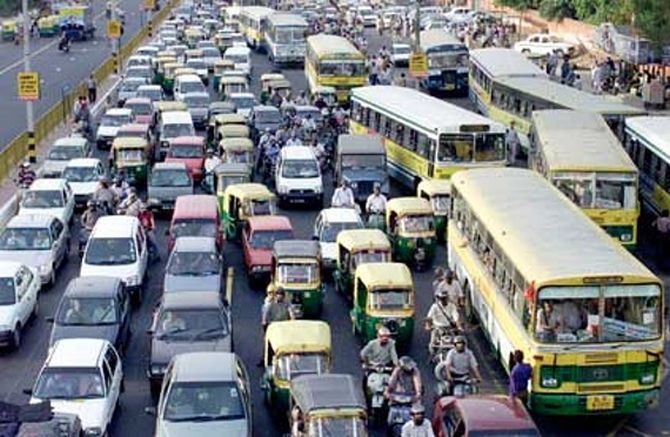
It may be too early to pronounce judgement on the AAP's road rationing scheme in Delhi, but businesses can pick up some cues from its execution, notes Shailesh Dobhal
The National Capital Region’s air quality has been bad for years now, and the debate around why and who’s responsible has been equally pungent and partisan.
Delhiites have wondered about the costs they may be paying by living in such a gas chamber, where levels of noxious gases and harmful particulate matter go up as much as 10 times the prescribed safe limits.
Those who could escape the city -- expats, foreign correspondents, well-to-do retirees and the rich with houses and offices in other, less polluted metros -- have done so.
Enter the Aam Aadmi Party’s odd-even scheme to allow cars with odd and even registration numbers on the roads on alternate days.
While the first, experimental phase of the 15-day scheme ends this Friday, its impact would be discussed and analysed ad nauseam in the days to come.
Here’s what I think it has got right in terms of marketing the scheme.
Go for the low-hanging fruit: For all the debate and data on the biggest polluter of Delhi air -- two-wheelers, cars, road dust, commercial vehicles to paddy-burning Punjab and Haryana farmers -- the AAP government rightly went for the easiest target, politically as well as in terms of ease of implementation -- the two million-odd car owners in the NCR. Being relatively rich, this segment could afford the inconvenience as it could take a taxi or an auto-rickshaw.
Also, monitoring car violations is much easier compared to two-wheelers, which are more than double the number of cars.
Time the launch right: The government picked just the right time, the first fortnight of the year, when schools are closed and many middle-class, car-driving Delhiites are out of the city on their annual Goa, Kerala and Rajasthan vacations. Imagine the pushback had Kejriwal attempted such a road-rationing trial in March, bang in the middle of school exams.
Before the blitzkrieg, get ready to go to the market: The implementation of the odd-even scheme was not left to chance, with around 6,000 civil defence volunteers helping out the central government-controlled Delhi Police personnel in ensuring that violators were brought to book, over 6,000 at last count.
To minimise inconvenience to commuters, hundreds of extra buses and more Metro rakes were pressed into service.
And this, even as the Kejriwal government has been engaged in an ugly one-upmanship with the National Democratic Alliance government that controls the Delhi Police, speaks volumes of the meticulous planning that went in making the country’s first such experiment click from day one.
Change your message with the context: Remember, there was all-round scepticism about the workability of the scheme from the time it was announced in early December last year. So what did Kejriwal, one of the most powerful political communicators of the day, do?
He started out by extolling people to at least give the scheme a try with a promise that it would be discontinued if people felt inconvenienced. He led by example, by refusing to avail of exemption on account of being the chief minister, becoming the scheme’s walk-the-talk ambassador.
Once the plan was on, he quickly changed track, appealing to the citizens’ good sense with stories that tugged at the heartstrings! Aren’t all good brand stories made of such stuff?
Don’t be shy of declaring victory: Competition is always incredulous, it doesn’t matter whether you’re the Kejriwal government or the world’s best consumer marketer.
At the first sign of dipping pollution levels, even if these were marginal, the AAP government announced victory, with Transport Minister Gopal Rai even telling the Delhi High Court that levels of harmful particulate matter were down a third, thanks to the scheme.
Every good marketer knows that nothing succeeds like success, and painting the 15 day-long trial as one will help launch it again.
Image: Delhi traffic. Photograph: Reuters











